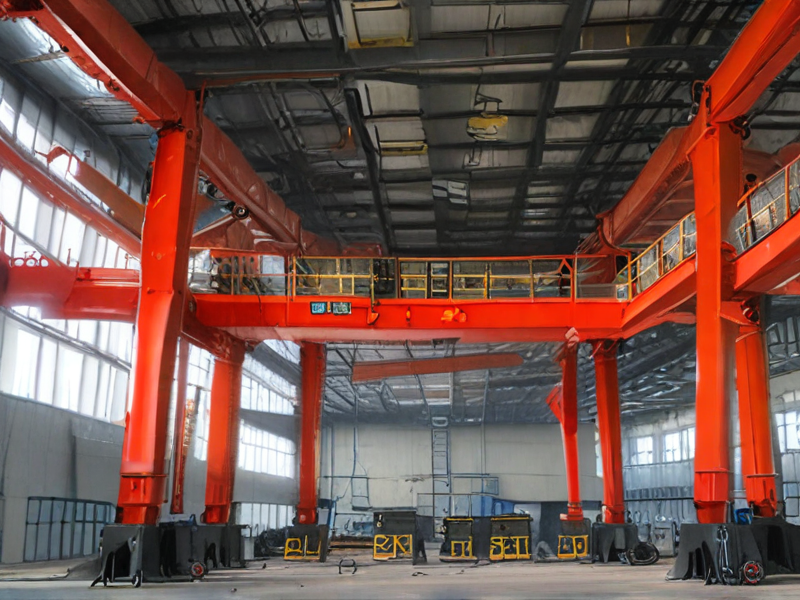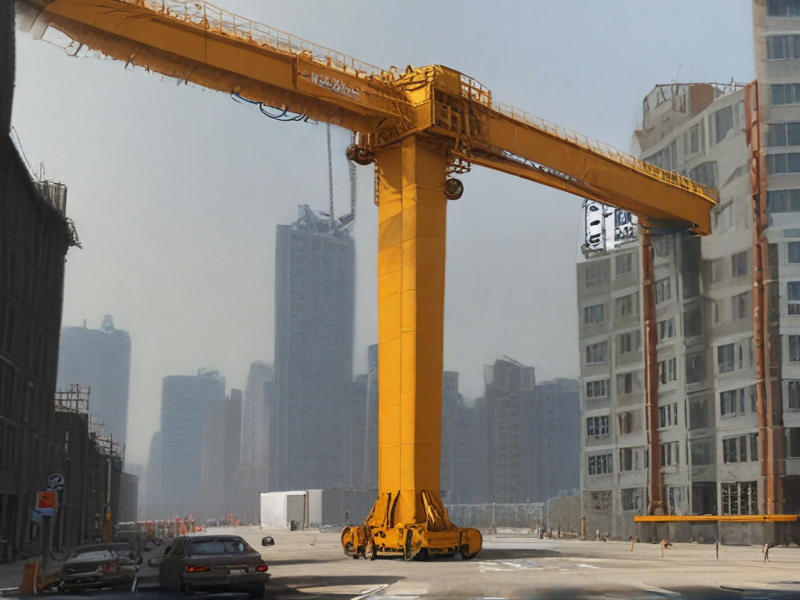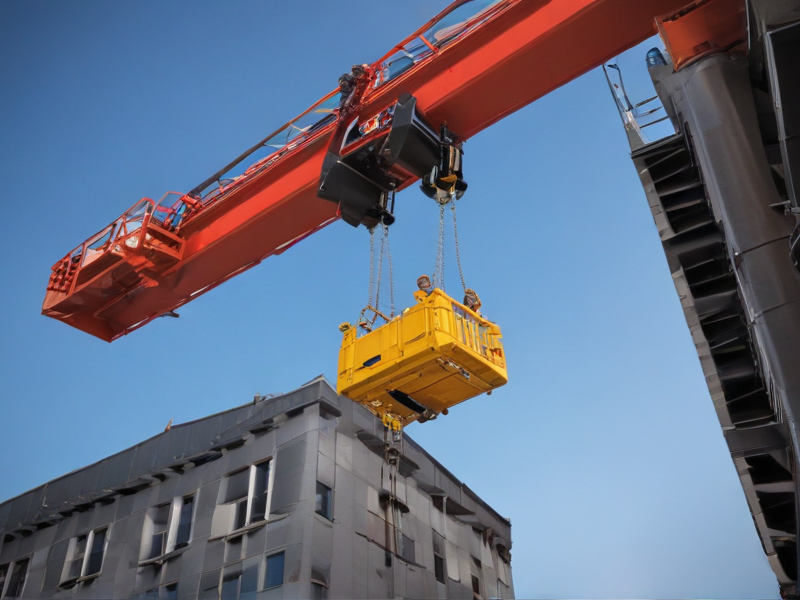Top 10 hoist crane company in China introduce,list main products and website if have
Certainly! Here are the top 10 hoist crane companies in China, along with their main products and websites:
1. XCMG Group
– Main Products: Mobile cranes, tower cranes, crawler cranes, hoist systems.
– Website: [www.xcmg.com](http://www.xcmg.com)
2. Zoomlion Heavy Industry Science & Technology Co., Ltd.
– Main Products: Tower cranes, mobile cranes, construction hoists.
– Website: [www.zoomlion.com](http://www.zoomlion.com)
3. Sany Group
– Main Products: Mobile cranes, crawler cranes, all-terrain cranes, port machinery.
– Website: [www.sanyglobal.com](http://www.sanyglobal.com)
4. Liebherr (China) Co., Ltd.
– Main Products: Tower cranes, mobile cranes, crawler cranes.
– Website: [www.liebherr.com](http://www.liebherr.com)
5. Zhejiang Dingli Machinery Co., Ltd.
– Main Products: Aerial work platforms, scissor lifts, cranes.
– Website: [www.china-dingli.com](http://www.china-dingli.com)
6. Tadano (Beijing)
– Main Products: Mobile cranes, rough terrain cranes, truck cranes.
– Website: [www.tadano.com](http://www.tadano.com)
7. Shandong Huaxia Group Co., Ltd.
– Main Products: Tower cranes, construction hoists, material handling equipment.
– Website: [www.hxzg.com](http://www.hxzg.com)
8. Henan Weihua Heavy Machinery Co., Ltd.
– Main Products: Overhead cranes, gantry cranes, electric hoists.
– Website: [www.weihuagrp.com](http://www.weihuagrp.com)
9. ZOOMLION-CIFA China
– Main Products: Construction hoist systems, tower cranes, concrete machinery.
– Website: [www.cifa.com](http://www.cifa.com)
10. Jiangsu Tongyuan Hydraulic Co., Ltd.
– Main Products: Tower cranes, construction hoists, hydraulic equipment.

How to find and select check reliable hoist crane company in China
To find and select a reliable hoist crane company in China, follow these steps:
1. Online Research:
– B2B Platforms: Start with trusted B2B platforms like Alibaba, Made-in-China, and Global Sources. These sites list numerous Chinese manufacturers and suppliers.
– Company Websites: Check the company’s official website for product range, specifications, and client reviews.
2. Verify Credentials:
– Certifications: Ensure the company has necessary certifications such as ISO9001, CE, or other relevant industry standards.
– Business License: Verify their business license and registration. This can often be done through Chinese business registration portals.
3. Quality and Compliance:
– Product Testing: Ask about their quality control processes and product testing certifications.
– Compliance: Ensure their products comply with international standards.
4. Experience and Reputation:
– Client Reviews and Testimonials: Look for reviews on platforms and seek testimonials from previous clients.
– History: Prefer companies with extensive experience and a good reputation in the industry.
5. Pricing and Quotations:
– Transparent Pricing: Get detailed quotations from multiple companies. Beware of prices that seem too good to be true.
– Payment Terms: Verify payment terms and conditions to avoid scams.
6. After-Sales Service:
– Warranty: Confirm warranty terms and conditions.
– Support: Check for after-sales service availability and responsiveness.
7. Site Visit:
– Physical Verification: If possible, visit their facility or ask for a virtual tour to verify their manufacturing capabilities.
8. Supplier Verification Services:
– Use independent third-party verification services like SGS, TÜV, or Intertek to inspect and authenticate the supplier.
By following these steps diligently, you can find a reliable hoist crane company in China that meets your specific needs.
Background Research for hoist crane company in China, use qcc.com archive.org importyeti.com
Conducting background research for a hoist crane company in China can be efficiently achieved using databases like qcc.com, archive.org, and importyeti.com. These platforms provide a comprehensive overview of business operations, historical data, and import/export activities, respectively.
1. Qcc.com: Qcc.com is an essential resource for accessing business registrations and corporate characteristics within China. Upon searching for the company name, you’ll retrieve detailed information such as registration number, date of incorporation, capital, legal representative, and ownership details. This site often includes annual reports, which offer insights into financial health, profitability, and overall business scale. Additionally, looking into the company’s shareholders and subsidiaries can reveal its market reach and potential vertical integration strategies.
2. Archive.org: This digital archive can serve as an invaluable tool when examining the company’s historical website snapshots, which could provide insight into how their product offerings, marketing strategies, and corporate communications have evolved over time. By examining these snapshots, it’s possible to track key growth milestones, identify shifts in strategic direction, or observe the company’s response to market changes and crises.
3. ImportYeti.com: For understanding the company’s international trade activity, ImportYeti.com tracks global shipping data, offering a detailed look at imports and exports. By entering the company’s name, you can uncover lists of their trading partners, shipment volumes, commodity types, and trade routes. This data reveals market penetration, export quality, and supply chain robustness, which are critical factors when assessing the company’s operational capabilities and market strategies.
Combining insights from these platforms fosters a comprehensive understanding of a hoist crane company’s operational landscape, market position, and growth trajectory in China. This strategic overview can inform investment decisions, partnership evaluations, and competitive analyses by providing a well-rounded profile of the company’s business practices and market footprint.

Price Cost Research for hoist crane company in China, use temu.com and 1688.com
Conducting price cost research for a hoist crane company in China involves leveraging platforms like Temu.com and 1688.com, which are widely used for B2B and B2C transactions.
Temu.com:
Temu.com primarily serves as a platform for various industrial and commercial products, including hoist cranes. Here, you can find a range of hoist cranes, from small-scale manual hoists to more advanced electric models. Prices generally vary depending on the load capacity, brand, and additional features. For instance:
– Manual Chain Hoist (1 Ton capacity): Approximately $50-$100.
– Electric Chain Hoist (1 Ton capacity): Ranges from $300 to $600.
– Wire Rope Hoist (1 Ton capacity): Typically between $500 and $1000.
You may also come across special discounts and bulk purchase deals, which can significantly reduce costs.
1688.com:
1688.com is a leading Chinese wholesale platform, offering more competitive pricing due to its focus on large volume transactions. It’s worth noting that the site predominantly operates in Chinese, so using translation tools or native assistance can be beneficial. Prices on 1688.com are often lower than on international sites due to the direct manufacturer access:
– Manual Chain Hoist (1 Ton capacity): Roughly ¥200-¥500 (approx. $30-$70).
– Electric Chain Hoist (1 Ton capacity): Between ¥1200-¥3000 (approx. $180-$450).
– Wire Rope Hoist (1 Ton capacity): Around ¥2500-¥6000 (approx. $370-$900).
Conclusion:
Prices on 1688.com tend to be lower than on Temu.com due to its direct manufacturer sales and lack of international shipping-related costs. For a hoist crane company looking to source equipment cost-effectively, 1688.com is likely the better option. However, for smaller quantities or more straightforward transactions, Temu.com offers a user-friendly and globally accessible platform.
Compare China and Other hoist crane company: Products Quality and Price,Visible and Hidden Costs
When comparing China’s hoist crane companies to global counterparts, several factors come into play: product quality, price, and costs both visible and hidden.
Product Quality:
Chinese hoist crane manufacturers have significantly improved in recent years. Leading Chinese brands now offer competitive quality that meets international standards. However, inconsistencies exist due to the broad range of manufacturers, with some producing superior products and others falling short. Global brands from Europe, Japan, and the USA generally offer high-quality hoist cranes, benefiting from longer traditions of engineering excellence and rigorous quality control processes.
Price:
Chinese hoist cranes generally come at a lower upfront cost compared to their international rivals. This price competitiveness stems from lower labor costs, economies of scale, and government support. Conversely, Western and Japanese brands command higher prices due to superior materials, advanced technology, and stringent manufacturing standards.
Visible and Hidden Costs:
Visible costs are straightforward: purchase price, shipping, and installation. Chinese cranes usually have lower visible costs, appealing to budget-conscious buyers.
Hidden costs are more nuanced. These include maintenance, downtime due to inefficiencies, and shorter product lifespan. Chinese hoists may incur higher hidden costs because of variable quality and potential need for more frequent repairs. Conversely, Western and Japanese hoists, while pricier upfront, may have lower hidden costs due to better durability, reliable performance, and comprehensive after-sales support.
In summary, while Chinese hoist cranes offer attractive initial pricing and have improved in quality, potential buyers should weigh visible savings against possible hidden costs. Western and Japanese hoist cranes, despite higher upfront costs, potentially offer long-term value through superior quality, reliability, and lower hidden expenses.
Custom Private Labeling and Branding Opportunities with Chinese hoist crane company
Partnering with a Chinese hoist crane manufacturer presents a plethora of opportunities for custom private labeling and branding. China’s robust manufacturing landscape and advanced technological capabilities make it an ideal choice for businesses looking to create unique, high-quality lifting solutions under their own brand.
To get started, identify reputable Chinese hoist crane companies with a strong track record in quality assurance, compliance with international standards, and technological innovation. Establishing a good relationship involves clear communication about your brand’s specific needs, including design preferences, functional requirements, and any particular customizations.
Most Chinese manufacturers are flexible and open to customization, offering options for branding such as personalized logos, custom color schemes, and tailored designs that align with your brand identity. By leveraging their existing production lines and expertise, you can ensure high efficiency and cost-effectiveness without compromising on quality.
Moreover, private labeling allows you to differentiate your product in the marketplace, adding value through proprietary branding and potentially commanding higher price points. It also provides a level of exclusivity and enhances brand recognition among customers.
Ensure to conduct due diligence with on-site visits, virtual inspections, and thorough quality control checks. Clear agreements and contracts regarding intellectual property rights, delivery schedules, and payment terms are crucial for a seamless partnership.
Additionally, taking advantage of digital tools to monitor the production process remotely, and establishing a reliable logistics chain for smooth importation and distribution, can significantly enhance your supply chain efficiency.
In conclusion, custom private labeling with a Chinese hoist crane manufacturer offers an excellent opportunity to enhance your brand’s market presence, add value to your product line, and achieve competitive advantage in the hoist crane industry.
Tips for Procurement and Considerations when Purchasing from hoist crane company
When procuring a hoist crane, it’s essential to ensure a thorough evaluation to guarantee efficiency, safety, and value for money. Here are key tips and considerations:
1. Requirements Assessment: Clearly define the operational requirements such as load capacity, height, speed, and environmental conditions. This ensures the selected crane meets specific needs.
2. Vendor Reputation: Research the manufacturer’s history and market reputation. Look for customer reviews, case studies, and industry certifications as indicators of quality and reliability.
3. Quality and Standards: Ensure the crane complies with international safety standards such as ISO, OSHA, and ASME. High-quality materials and workmanship enhance durability and safety.
4. Customization Options: Some operations require specific features. Verify if the manufacturer offers customization to cater to unique operational needs.
5. After-Sales Support: Reliable after-sales support is crucial for maintenance and troubleshooting. Evaluate the availability of spare parts, service contracts, and technical support.
6. Cost Analysis: Look beyond the initial purchase price. Consider the total cost of ownership including installation, maintenance, operational efficiency, and potential downtime. Compare quotes from multiple suppliers for a comprehensive view.
7. Training and Safety: Confirm that the vendor provides proper training for operators. Adequate training reduces operational risks and enhances productivity.
8. Warranty and Guarantees: Check for robust warranty terms that cover significant components and services. This provides a safety net against early failures.
9. Technology and Innovation: Opt for cranes with advanced features like remote control, automation, and smart diagnostics which can improve performance and safety.
10. Site Visits and Demos: If possible, arrange site visits or product demonstrations. Seeing the crane in action provides better insight into its performance and suitability.
Careful consideration of these factors will help in making an informed and strategic procurement decision, ensuring long-term operational benefits and safety.

FAQs on Sourcing and Manufacturing from hoist crane company in China
FAQs on Sourcing and Manufacturing from a Hoist Crane Company in China
Q1: Why should I source hoist cranes from China?
China is a global leader in manufacturing and offers a combination of high-quality products and competitive pricing. Chinese manufacturers invest heavily in technology and innovation, ensuring modern and efficient hoist cranes.
Q2: How do I verify the credibility of a Chinese hoist crane manufacturer?
Inspect customer reviews, request references, and verify quality certifications like ISO. Conduct factory audits or hire third-party inspection services to assess the manufacturer’s capabilities and practices.
Q3: What are the lead times for manufacturing and delivery?
Lead times vary by order complexity and size. Generally, it takes 4-8 weeks for production and another 3-6 weeks for shipping. Confirm specific timelines with the manufacturer during the negotiation phase.
Q4: Can I customize the hoist crane designs?
Yes, most Chinese manufacturers offer customization options. You can specify dimensions, load capacity, and additional features. Always communicate your requirements clearly to ensure accurate manufacturing.
Q5: What are the payment terms typically required?
Common payment terms include a 30% deposit with the balance payable upon shipment. Some manufacturers may offer Letter of Credit (L/C) options. Always clarify terms before placing an order.
Q6: Are warranties and after-sales services provided?
Reputable manufacturers provide warranties ranging from 1-3 years, covering parts and service. After-sales support often includes technical assistance, spare parts, and on-site service if needed.
Q7: What are the shipping options and costs?
Shipping methods include sea freight, air freight, and rail. Costs depend on the destination, shipment size, and mode of transport. Discuss Incoterms like FOB (Free On Board) or CIF (Cost, Insurance, and Freight) with your supplier.
Q8: How do I handle quality control?
Implement a rigorous quality control plan. Hire third-party inspectors for pre-shipment inspections. Ensure compliance with international standards and conduct factory visits if possible.
Q9: What documents are needed for importing hoist cranes?
Key documents include the Proforma Invoice, Commercial Invoice, Bill of Lading, Packing List, Certificate of Origin, and any required import licenses or permits. Confirm documentation specifics with your customs broker.
Q10: Can I visit the factory before making a decision?
Yes, factory visits are encouraged. They offer firsthand insights into production processes, quality control, and the facility’s overall standards. Coordinate visits through the manufacturer’s sales team.

